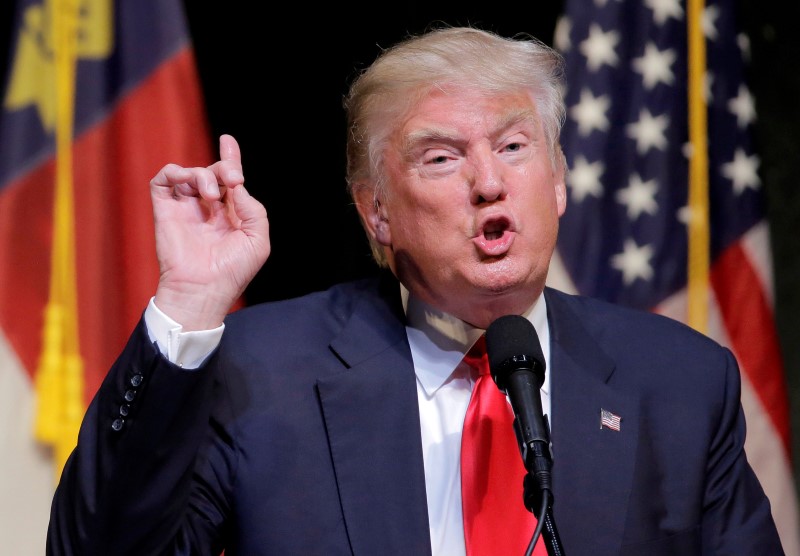(Bloomberg Opinion) -- As millions of his fellow citizens began easing into Thanksgiving, President Donald Trump was tweeting about oil again early on Wednesday morning.
While it constitutes a capital offense in oil-trading circles, the president mixing up West Texas Intermediate and Brent crude oil prices there is a mere trifle. Meanwhile, Texas and North Dakota may beg to differ somewhat on the effective-tax-cut thing.
The more important aspect of this, however, is what it says about one of the defining phrases of Trump’s presidency: “energy dominance.”
The tweet came a day after the president pardoned a turkey and issued an official statement about Saudi Arabia for which the phrase “where to start?” surely was invented. Its panoply of non sequiturs, inventions and exclamation points gave it an almost dreamlike quality. Throw in a couple of brilligs and we could have been marveling at the lost – albeit somewhat darker – stanzas of the Jabberwocky.
Lurking within, however, were some insights into where we are after almost two years of Trump’s drive for energy dominance.
The obvious reading is that this particular form of dominance leaves something to be desired. Despite the fact the U.S. may technically reach net oil imports of zero as soon as next year, the president felt it necessary to issue a statement that – while it led with “America First!” – could just as easily have been boiled down to a wild chant of “K-S-A! K-S-A!” And then he followed it up with a tweet that, in thanking Riyadh for falling oil prices, cast the U.S. as supplicant rather than master.
As my colleague Bobby Ghosh wrote on Wednesday, the president’s apparent willingness to throw overboard any moral qualms about the killing of journalist Jamal Khashoggi (and facilitate smears against him) runs counter to the real leverage the U.S. has over Saudi Arabia, not least in terms of the country’s ability to both wage war and defend itself.
When it comes to energy, the relationship is more complex. Despite surging production, the U.S. remains part of a global market that still provides it with about six million barrels a day of net crude-oil imports and much more to key allies around the world. Mathematical independence from oil imports is one thing; actual physical flows from field to refinery to customer are quite another.
I tend to think “energy dominance” is more about flogging U.S. energy overseas than anything else (see this). The surest means of asserting independence from foreign energy producers – namely, limiting consumption – is actively undermined by this administration.
Yet America’s role in the global oil market clearly has changed. Rather than dominance, though, I would characterize it as impermanence.
The relationship between the U.S. and Saudi Arabia has always involved turning a blind eye on human rights in exchange for energy and foreign-policy goals. But the Khashoggi affair highlights this at a time when U.S. dependence on oil imports, while still substantial, is falling at a rate that lets Washington be more assertive in condemning Riyadh if it so chooses.
This is a recipe for contradictions and uncertainty about a geopolitical relationship that, like so much else, is open to question as the main architect of the postwar order begins shredding the blueprints. Trump is in Prince Mohammed Bin Salman’s corner today and lauding Saudi Arabia's importance. But only last month he was boasting how the king wouldn’t last two weeks without Uncle Sam’s backing.
This gets at the real significance of Trump’s words and why the jumbled language actually suits the situation. The Middle East’s old order is crumbling as a more competitive global energy market and demographic and technological pressures upend the social contract underpinning regimes like Riyadh’s . This is the fragility lurking at the heart of the global oil market, with the tragedy of Venezuela providing a glaring example of the havoc wreaked when petrostates succumb to their inherent weaknesses.
America’s changing role on both the energy and security fronts exacerbates this. And the White House has put Prince Mohammed at the heart of multiple policies pertaining to Middle Eastern foreign policy and energy. In doing so, it has placed its chips on a leader displaying all the signs of an impulsive autocrat. While defended as realpolitik, it actually raises the risk of further instability in this crucial region. America may never dominate the oil market again, but its capacity to tip it into turmoil is real enough.
